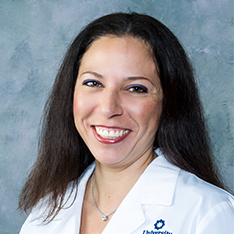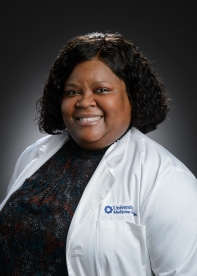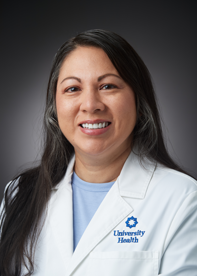Trusted San Antonio Geriatricians
Geriatricians are doctors that specialize in senior health. They treat people who are 65 or older who may experience complications of aging. At University Health, we start reaching out to people when they turn 60 with educational information so they can stay healthy and engaged.
As you get older, you may begin to naturally develop health conditions that might need extra attention.
Conditions We Treat
- Balance problems
- Bladder control problems
- COPD (chronic obstructive pulmonary disorder)
- Decline in mental capacity
- Delirium
- Dementia
- Diabetes
- Hearing loss
- Memory loss
- Osteoporosis (brittle bones)
- Prostate disease
- Sleep problems
- Weight loss
Senior health doctors also see older adults with social problems, mental illness or disabilities who may need extra care.
Advance Care Planning
Senior Services at University Health can assist you with advance care planning, including Medical Power of Attorney and Advance Directives/Living Wills at no cost to you.
Medical Power of Attorney
A legal document that authorizes someone you trust to make medical decisions on your behalf when you unable to communicate your wishes.
Advance Directive/Living Will
A legal document that explains your wishes regarding your health care if you are terminally ill or in a permanent coma and are unable to communicate. They are called “living” wills because they take effect while the patient is still alive.
Please call Senior Services for more information about advance care planning at 210-358-7477.
What to Expect at Your Medicare Annual Wellness Visit
If you are enrolled in Medicare, you can get yearly checkups at little or no cost. If you need help signing up for Medicare, please call us at 210-358-7477.
Your yearly Medicare Wellness appointment checks your overall health and aims to prevent sickness before it starts. You might expect the following during your visit:
- Advance Directives & Medical Power of Attorney
- Blood pressure check
- Bloodwork to check cholesterol levels and vitamin deficiencies
- BMI (Body Mass Index)
- Colonoscopy
- Depression screening
- Discussion and review of preventative services
- Fall risk assessment
- Mammogram
- Medication guidance
- Prostate screening
- Smoking cessation information
- Vaccines and immunizations
If the provider believes you need more care for a behavioral or mental health issue, they will encourage you to contact your primary care provider.
Get Your Prescriptions Mailed to You
Getting your medications mailed to your home is helpful if you cannot drive or have trouble leaving your home. Many pharmacies now offer the option to deliver your prescriptions right to your door, including University Health Pharmacies.
Ask your pharmacist about how to get your prescriptions mailed to your home.
Fall Prevention
As people age, they may lose their balance and coordination. This can lead to falling, which can cause serious injury and broken bones. In fact, the National Council on Aging cites falls as the leading cause of injuries and fatalities in elderly Americans.
This might sound scary, but we don’t want you living in fear or limiting your normal activities. At University Health, we teach older adults how to help prevent falls in their homes and live an active lifestyle. Please call us at 210-358-4295 for more information.
How to Prevent Falls
- Keep clutter out of the way
- Install handrails and grab bars in the bathroom, stairway and hallways
- Install brighter lights in hallways, bathrooms and bedrooms
- Wear shoes or non-slip socks
- Add non-slip mats to your floors and bathtub
- Avoid stairs when possible
Making small adjustments in your home can help you feel more in control. This way, you don’t have to stop socializing and moving around your house like you are used to. A fear of falling can cause depression and feelings of helplessness in older people, but we are here to help you fight that.
Managing Diabetes as You Get Older
More than 1 in 10 Texans has diabetes, a condition that puts you at higher risk for heart disease, stroke and kidney failure. South Texans are lucky to have one of the nation’s premier diabetes care facilities right here in San Antonio – Texas Diabetes Institute.
Older adults are at a higher risk of developing Type 2 diabetes. The best ways to manage your diabetes are to eat healthy and exercise regularly. You should also take the following preventative measures:
- Set regular reminders to check your blood sugar
- Check your blood pressure often
- Keep up with annual eye exams
- Get your flu shot
- Keep your skin clean and dry, especially your feet
- Ask your doctor what cancer screenings they recommend for you
Diabetes Education
University Health patients have access to educational programs tailored specifically to diabetes, like:
- Classes about diabetes management
- Prediabetes class
- Heart health classes
- Weight loss classes
For more information, please call 210-358-7100. No physician’s referral required but is encouraged.
Smoking Cessation
Please talk to your provider about treatment for smoking cessation. According to the Centers for Disease Control and Prevention, smokers are 30-40% more likely to develop Type 2 diabetes. If you have diabetes and smoke, you are at a higher risk of:
- Blindness
- Heart disease
- Kidney disease
- Nerve damage
- Poor blood flow to extremities
Questions to Ask Your Doctor
We want you to feel in control of your health. Asking the right questions can make sure that you have the information you need to make smart choices about your health and lifestyle. Print a PDF of these questions to bring to your next appointment.
Here are some questions you can ask your doctor:
- Why do I feel dizzy when I stand up?
- I’m having more trouble breathing lately – is this normal?
- I’m feeling depressed and lonely lately. Where can I get help?
- How do I know if my memory loss is normal?
- What are signs of dementia and Alzheimer’s?
- When do I need a hearing aid?
- Can you help me quit smoking?
- Are there ways to prevent vision loss?
- Do I still need to get mammograms and an annual physical exam?
- What is my diagnosis?
- What is the purpose of the medication?
- How will the medication affect me?
- Are any follow-ups needed?
- Do I need any special nutrition?
- Do I need any supplements or vitamins?
- What is my risk of falling?
- What should I work on for the next visit?
- Understanding the Basics of Medicare
- Advance Care Planning
For more information, please call 210-358-7477.







